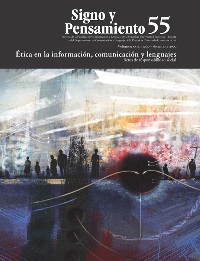Resumo
Este artigo tem como objetivo analisar o estado atual da pesquisa sobre ética intercultural da informação (EII), incluindo tanto os debates fundamentais sobre o tema, quanto as discussões específicas que podem mostrar novas formas de abordar a pesquisa e a prática nesse campo. O atual debate sobre EII enfoca uma visão reducionista desse campo e deixa de fora estudos comparativos com mídias não digitais e com outras eras e culturas. O tema da privacidade recebe um tratamento especial, mas a agenda também inclui outras, como comunidades on-line, governança, questões de gênero, telefonia móvel, atendimento médico e a exclusão digital.
Bynum, Terrell Ward (2006). Flourishing Ethics. Ethics and Information Technology, 8: 157-173.
Capurro, Rafael (2007). Intercultural Information Ethics. In: Capurro, Rafael / Frühbauer, Johannes / Hausmanninger, Thomas (Eds.): Localizing the Internet. Ethical aspects in intercultural perspective. Munich: Fink, 21-38. Online: http://www. capurro.de/iie.html
Capurro, Rafael (2006a). Ethik der Informationsgesellschaft. Ein interkultureller Versuch. Online: http://www.capurro.de/parrhesia. html (accessed on April 21, 2008).
Capurro, Rafael (2005a). Privacy. An intercultural perspective. In Ethics and Information Technology 7: 37-47. Online: http://www.capurro. de/privacy.html
Capurro, Rafael / Frühbauer, Johannes / Hausmanninger, Thomas (Eds.) (2007). Localizing the Internet. Ethical aspects in intercultural perspective. Munich: Fink.
Damasio, Antonio (1994). Descartes’ Error: Emotion, Reason, and the Human Brain. Putnam Publishing.
Ess, Charles (2007). Can the Local Reshape the Global? Ethical Imperatives for Humane Intercultural Communication Online”. In Capurro, Rafael / Frühbauer, Johannes / Hausmanninger, Thomas (Eds.) (2007). Localizing the Internet. Ethical aspects in intercultural perspective. Munich: Fink, 153-169.
Ess, Charles (2006). Ethical pluralism and global information ethics. In Ethics and Information Technology 8:215-226.
Floridi, Luciano / Savulescu, Julian (2006). Information ethics: Agents, artefacts and new cultural perspectives. Ethics and Information Technology 8: 155-156.
Foucault, Michel (1983). Discourse and Truth: the Problematization of Parrhesia. University of California at Berkeley, October-November 1983. Online: http://foucault.info/documents/ parrhesia/ (Accessed on April 21, 2008).
Frohmann, Bernd (2007). Foucault, Deleuze, and the Ethics of Digital Networks. In Capurro, Rafael / Frühbauer, Johannes / Hausmanninger, Thomas (Eds.) (2007). Localizing the Internet. Ethical aspects in intercultural perspective. Munich: Fink, 57-68.
Grodzinsky, Frances S. / Tavani, Herman T. (2007). The Internet and Community Building at the Local and Global Levels: Some Implications and Challenges. I. Capurro, Rafael / Frühbauer, Johannes / Hausmanninger, Thomas (Eds.): Localizing the Internet. Ethical aspects in intercultural perspective. Munich: Fink, 135-149.
Heidegger, Martin (1987). Being and Time. Translated by John Macquarrie & Edward Robinson, Oxford: Basil Blackwell. Hiruta, Kei (2006). What pluralism, why pluralism, and how? A response to Charles Ess. Ethics and Information Technology 8: 227-236.
Hongladarom, Soraj (2007). Analysis and Justification of Privacy from a Buddhist Perspective. In Hongladarom, Soraj / Ess, Charles (Eds.): Information Technology Ethics: Cultural Perspectives. Hershey, Pennsylvania: Idea Group, 108-122.
Hongladarom, Soraj / Ess, Charles (Eds.) (2007). Information Technology Ethics: Cultural Perspectives. Hershey, Pennsylvania: Idea Group.
Hongladarom, Soraj / Ess, Charles (2007a): Preface. In: ibid.: Information Technology Ethics: Cultural Perspectives. Hershey, Pennsylvania: Idea Group, xi-xxxiii.
Hongladarom, Soraj (2001). Cultures and Global Justice. Online: http://www.polylog.org/them/3/fcshs-en-htm (Accessed on April 21, 2008).
International Review of Information Ethics (irie) (2004). International ICIE Symposium. Online: http://www.i-r-i-e.net/ (Accessed on April 21, 2008).
Kitiyadisai, Krisana (2005). Privacy rights and protection: foreign values in modern Thai context. In Ethics and Information Technology 7: 17-26.
Lü, Yao-huai (2007). Globalization and Informatioan Ethics. In Capurro, Rafael / Frühbauer, Johannes / Hausmanninger, Thomas (Eds.): Localizing the Internet. Ethical aspects in intercultural perspective. Munich: Fink, 69-73.
Lü, Yao-huai (2005). Privacy and data privacy in contemporary China. In Ethics and Information Technology, 7: 7-15.
Nishigaki, Toru and Takenouchi, Tadashi (eds.) (2007): The Thought of Information Ethics. Tokyo: Communis 05 (in Japanese).
Nakada, Makoto (2007). The Internet within Seken as an old and indigenous world of meanings in Japan”. In Capurro, Rafael / Frühbauer, Johannes / Hausmanninger, Thomas (Eds.): Localizing the Internet. Ethical aspects in intercultural perspective. Munich: Fink, 177-203.
Nakada, Makoto / Tamura, Takanori (2005). Japanese conceptions of privacy: An intercultural perspective. In Ethics and Information Technology 7: 27-36.
Nishigaki, Toru (2006). The ethics in Japanese information society: Consideration on Francisco Varela’s The Embodied Mind from the perspective of fundamental informatics. Ethics and Information Technology, 8:237-242.
Rhee, Wonil (2007). The creative time of thermocline. Conflicts between and Becomings of different Time-spaces. In “Thermocline of Art. New Asian Waves” at the Center for Art and Media (Karlsruhe, Germany) Online: http://www.zkm.de/thermocline (Accessed on April 21, 2008).
Sontag, Susan (2004). Die Welt als Indien. In Lettre International, September, Vol. 65, 82-86.
Walzer, Michael (1994). Thick and Thin: Moral Arguments at Home and Abroad. Notre Dame: University of Notre Dame Press.
Wittgenstein, Ludwig (1989). Vortrag über Ethik. Frankfurt a. M.: Suhrkamp.
Wittgenstein, Ludwig (1984). Zu Heidegger. In: B.F. McGuiness (Ed.): Ludwig Wittgenstein und der Wiener Kreis. Gespräche, aufgezeichnet von Friedrich Waismann. Frankfurt a. M.: Suhrkamp.
Esta revista científica está registrada sob a licença Creative Commons Attribution 4.0 International. Portanto, este trabalho pode ser reproduzido, distribuído e comunicado publicamente em formato digital, desde que os nomes dos autores e da Pontificia Universidad Javeriana sejam mencionados. Você pode citar, adaptar, transformar, auto-arquivar, republicar e desenvolver o material, para qualquer finalidade (inclusive comercial), desde que reconheça adequadamente a autoria, forneça um link para o trabalho original e indique se foram feitas alterações. A Pontificia Universidad Javeriana não retém os direitos sobre os trabalhos publicados e o conteúdo é de responsabilidade exclusiva dos autores, que mantêm seus direitos morais, intelectuais, de privacidade e publicidade.


